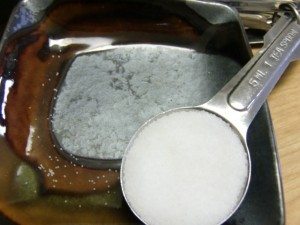 There was nothing really surprising in the 2010 Dietary Guidelines. The report reminded us that we have an obesity epidemic and should balance calories and physical activity to maintain a healthy weight.
There was nothing really surprising in the 2010 Dietary Guidelines. The report reminded us that we have an obesity epidemic and should balance calories and physical activity to maintain a healthy weight.
In the 112 page document there were also key recommendations. The recommendations were the same principals stressed due to increasing evidence that 1) we have been doing a poor job following the 2005 guidelines and 2) we are not “…limit[ing] the intake of food components that increase the risk of certain chronic diseases.”
Today, I want to specifically address sodium and the key recommendation to reduce sodium intake. Do you have any idea of how much your sodium intake was today? Sodium and high blood pressure go hand-in-hand. A high sodium intake raises blood pressure and a decreased sodium intake will lower blood pressure. The American Heart Association’s pamphlet, Why Should I Limit Sodium, states that individuals “…with high blood pressure are more likely to develop heart disease and stroke.”
Sodium in the body
Sodium is an important mineral and is needed by our body — just not in the amounts we enjoy. As one of our major minerals, sodium helps to maintain our acid-base balance (the pH of our blood) and is essential for nerve transmission and muscle contraction.
Sodium is easily absorbed into our blood stream through the intestinal tract before traveling to our kidneys for processing. The kidneys filter sodium out of our blood and then returns it in the amounts our body needs. Normally excess sodium will be excreted in our urine; however, if our kidneys cannot eliminate the excess sodium then it starts to accumulate in our blood.
Blood pressure
Sodium retains water and when this happens in our blood, volume increases. This causes our heart to pump out more blood each minute. Blood pressure is the measure of the blood against the artery walls. Your blood pressure is usually taken when you visit the doctor. She or he reads off two numbers such as 110 over 60. I never really understood what those numbers meant and pretty much interpreted their meaning based on my Doctor’s reaction and tone. It was always good, so I never worried.
Then I read two articles on WebMD and the American Heart Association that explained blood pressure. And 110 over 60, my recent reading, is considered good. The first number, for example 110, is the systolic number and is always read first. The systolic number represents the pressure your heart exerts while pumping blood. The second number or diastolic, 60, represents your heart’s pressure relaxing between beats.
I liken blood pressure to driving. Some people drive in perpetual road rage every day and others drive like it’s Sunday. So my blood pressure is like a Sunday drive and is considered healthy for a long life.
The key amount for health
Not surprisingly, the majority of sodium intake is from processed foods. Nearly 75% of sodium in the diet comes from food manufacturers. 15% is attributed to salt added during cooking. Only 10% of sodium comes from natural foods.
The key recommendation for sodium is less than 2,300 mg per day,

and less than 1,500 mg for individuals over 51, anyone who is African American, or any individual who has hypertension, diabetes, or chronic kidney disease. According to the 2010 guidelines 1,500 mg per day applies to about half the U.S. population including children!
How many of us automatically and mindlessly reach for the salt when having eggs?
Tips to cutting salt are to select fresh foods, use other spices such as garlic, curry, or ginger, and to cook with no added salt.
It is very rare that I add salt when cooking. In fact I’ve been cooking with little or no added salt so long that my Fiancee barely notices! It is this small change that has led to even bigger changes such as ordering food without salt and experimenting with other spices.
More tips..
Sodium: How to tame your salt habit now
The Salt Solution: Cutting Back on Sodium
Gail says
Great Post Tabitha…you took me home with your link to the Mayo Clinic. My Danny turns 60 tomorrow, makes the sodium issue very real with his high blood pressure. Thanks for all the hard work you do on this web site. You bring it all together so we don’t have to search for the info ourselves. I love it! I
Luke says
Wish Dan a happy belated birthday for us!
LivingFood101 says
I agree, using spices as a substitute is a great way to reduce the salt intake.
Tabitha says
Thank you Gail! How were the birthday festivities?
Gail says
We actually don’t celebrate birthday’s, BUT if we did, I think these are the numbers we would like to forget! Oh to be young………..!